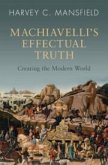This deluxe clothbound edition presents Machiavelli's classic work on the philosophy of power. Published posthumously in 1532, Machiavelli's treatise on the manipulation and exercise of power advocated a ruthless realpolitik, sparking a debate about the morality of statesmanship that is still very much alive today. His shrewd text presents strategies that some of history's greatest - and most infamous - rulers have borrowed to achieve their goals. The Prince continues to show enduring popularity among anyone interested in the theory of leadership and power. This compact clothbound edition features silver embossing on the cover, gold-gilded page edges and illustrations inside, making a wonderful gift. ABOUT THE SERIES: Arcturus Ornate Classics are beautifully bound, pocket-sized gift editions of iconic literary works from across history, featuring gilded page-edges, deluxe ivory paper and custom endpapers.
Hinweis: Dieser Artikel kann nur an eine deutsche Lieferadresse ausgeliefert werden.
Hinweis: Dieser Artikel kann nur an eine deutsche Lieferadresse ausgeliefert werden.








